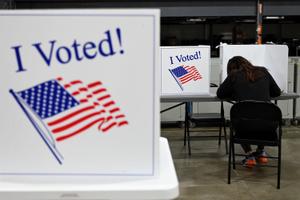Spotlight PA is an independent, nonpartisan newsroom powered by The Philadelphia Inquirer in partnership with PennLive/The Patriot-News, TribLIVE/Pittsburgh Tribune-Review, and WITF Public Media. Sign up for our free newsletters.
The 2021 election in Pennsylvania is Tuesday, Nov. 2 — and there’s a lot on the ballot.
Races for mayor in Harrisburg and Pittsburgh, district attorney in Philadelphia, county council in Delco, and borough council in State College are just a few of the local contests that voters will decide.
There also are noteworthy school board races with culture war and labor strife implications, and high-stakes statewide contests for key judiciary posts higher up the ballot. More on both in a moment.
First, the basics:
Confirm you’re registered to vote here. If you haven’t already registered, it’s too late.
Learn about your mail ballot return options here. If you’re mailing your ballot, don’t delay, and check the postage before sending it off. The ballot must arrive at a county election office by 8 p.m. Election Day. Consider hand-delivering it instead. It is too late to request a mail ballot.
Find your polling place here. Polls are open for in-person voting from 7 a.m. to 8 p.m.
Take a photo ID to vote in person only if you’re at a polling place for the first time.
Read Spotlight PA’s handy guide to polling places, voting by mail, and more here.
Before voting, pull up your sample ballot to get a preview of the candidates and questions you’ll be asked to weigh in on.
Spotlight PA compiled a guide for vetting candidates — and their donors — that focuses on the school board contests that are drawing inordinate amounts of attention and money amid fights over school mask rules and teachings on ethnicity and race.
In short, a good deal of candidate research can be performed via the internet. Donor research for local races, however, might require physically traveling to your local seat of government.
Thanks to state-level campaign finance rules, the legwork is easier — relatively speaking — for vetting statewide candidates, such as those vying for an opening on Pennsylvania’s incredibly influential Supreme Court.
The two-way race between Democrat Maria McLaughlin and Republican Kevin Brobson has attracted millions of dollars in donations. Read Spotlight PA’s list of the candidates’ top donors.
The outcome of that race won’t change the high court’s balance of power, but the new justice will have a say in what cases the court accepts. They’ll also cast their vote in closely watched proceedings — some potentially overlapping with donor interests.
Voters statewide — regardless of party affiliation — will also be naming judges to two other powerful appellate courts: Commonwealth and Superior.
Spotlight PA took a look at the candidates for all three judiciary contests. Deborah Gross, president of the advocacy organization Pennsylvanians for Modern Courts, calls the races some of the most important imaginable.
Gross said decisions handed down by these courts affect everyday Pennsylvanians “probably more so than a legislator,” adding, “The judges in these positions really rule on every aspect of a person’s or business’ life.”
Not convinced? Watch Spotlight PA’s panel on why these elections matter.
Happy voting.
WHILE YOU’RE HERE… If you learned something from this story, pay it forward and become a member of Spotlight PA so someone else can in the future at spotlightpa.org/donate. Spotlight PA is funded by foundations and readers like you who are committed to accountability journalism that gets results.
